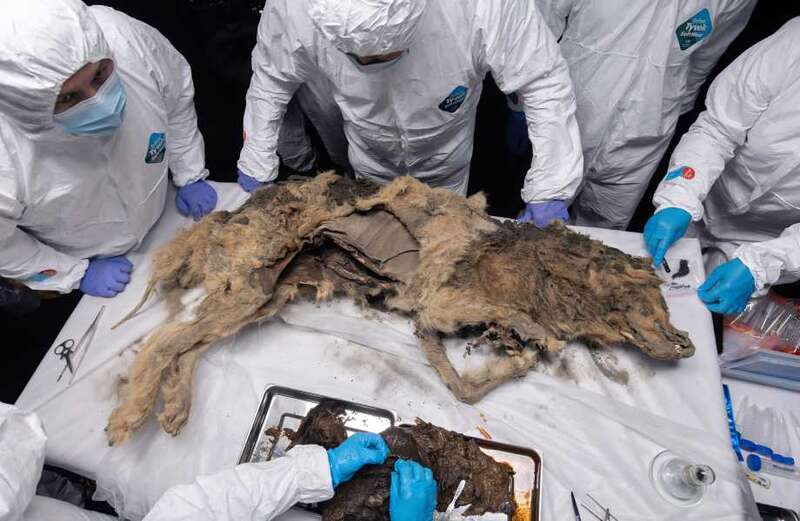SCIENTISTS have conducted an autopsy of an ancient wolf that was found frozen solid after 44,000 years with its last meal still in its stomach.
The snarling Ice Age beast was perfectly preserved in the Siberian permafrost and could unearth prehistoric super-viruses.



Scientists aim to detect and study ancient viruses and microbiota as well as the animal's diet as its last meal still sits in its stomach.
Since the stomach bacteria has remained frozen and untouched for thousands of years it now has the potential to unleash new disease.
Samples of the mummified creature were also taken to compare it with modern day predators.
 Man fined £165 after outraging the internet by dying puppy to look like Pikachu
Man fined £165 after outraging the internet by dying puppy to look like Pikachu
It is the oldest known wolf to undergo such an autopsy.
Locals made the terrifying discovery in 2021 at a dept of roughly 130ft in Russia's coldest region, Yakutia.
It was then transferred to the Mammoth Museum Laboratory of the Northeast Federal University in Yakutsk.
Dr Albert Protopopov, head of the Mammoth Fauna Study Department of the Yakutia Academy of Sciences, said: "Its stomach has remained isolated, without contamination.
“As a result of the dissection, we hope to get an instantaneous cross-section of the biota of the ancient Pleistocene period.
“It was an active and large predator, and we have the opportunity to find out what it ate.
“Additionally, its stomach contains the remains of what its prey consumed.”
Dr Maxim Cheprasov, head of the Mammoth Museum Laboratory, said: "We extracted a premolar – a tooth – to determine the biological age of the find.
“However, based on the wear of the teeth and the development of the sagittal crest, we can already say that this is an adult male.”
Despite fears of the mysterious wolf meal unleashing deadly diseases, Professor Artemy Goncharov from the Institute of Experimental Medicine said the investigation could have modern-day benefits.
 Dog who 'always melts hearts' with his smile hopes to find a loving family
Dog who 'always melts hearts' with his smile hopes to find a loving family
He said: “We see that live bacteria can survive in the finds of fossil animals for millennia, serving as witnesses to those ancient times,
“We hope for good results that will allow us to further understand what ancient microbial communities were like, what function they performed, and how dangerous pathogenic bacteria were represented in their structure.
“It is possible that microorganisms will be found that can be applied in medicine and biotechnology as promising producers of biologically active substances.
“Therefore, this research has a special influence on the future.”







































